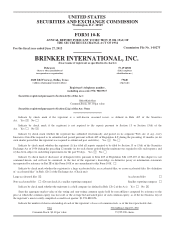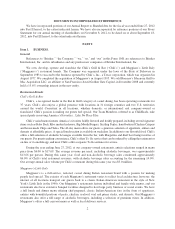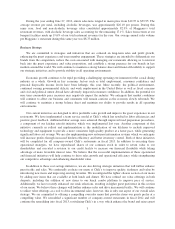Chili's 2012 Annual Report Download - page 17
Download and view the complete annual report
Please find page 17 of the 2012 Chili's annual report below. You can navigate through the pages in the report by either clicking on the pages listed below, or by using the keyword search tool below to find specific information within the annual report.Our restaurants also face competition from the introduction of new products and menu items by competitors,
as well as substantial price discounting and other offers, and are likely to continue to face such competition in the
future. Although we may implement a number of business strategies, the future success of new products,
initiatives and overall strategies is highly difficult to predict and will be influenced by competitive product
offerings, pricing and promotions offered by competitors. Our ability to differentiate our brands from their
competitors, which is in part limited by the advertising monies available to us and by consumer perception,
cannot be assured. These factors could reduce the gross sales or profitability at our restaurants, which would
reduce the revenues generated by company-owned restaurants and royalty payments from franchisees.
Changing health or dietary preferences may cause consumers to avoid our products in favor of alternative
foods. The food service industry as a whole rests on consumer preferences and demographic trends at the local,
regional, national and international levels, and the impact on consumer eating habits of new information
regarding diet, nutrition and health. We and our franchisees depend on the sustained demand for our products,
which may be affected by factors we do not control. Changes in nutritional guidelines issued by the federal
government agencies, issuance of similar guidelines or statistical information by other federal, state or local
municipalities, academic studies, or advocacy organizations among other things, may impact consumer choice
and cause consumers to select foods other than those that are offered by our restaurants. We may not be able to
adequately adapt our menu offerings to keep pace with developments in current consumer preferences, which
may result in reductions to the revenues generated by our company-owned restaurants and the payments we
receive from franchisees.
The global economic crisis continues to impact consumer discretionary spending and a prolonged
economic recovery could result in declines in consumer discretionary spending materially affecting our
financial performance in the future.
The restaurant industry is dependent upon consumer discretionary spending. Consumer confidence has not
recovered from historic lows impacting the public’s ability and/or desire to spend discretionary dollars as a result
of job losses, home foreclosures, significantly reduced home values, investment losses in the financial markets,
personal bankruptcies and reduced access to credit. Current international fiscal concerns threaten to weaken the
slow U.S. economic recovery. While sales and traffic gains have been made by the restaurant industry and our
restaurants in fiscal 2012, the economic improvement in the restaurant industry continues to come from cost
savings initiatives as well as our success to improve our guest experience within our existing restaurant locations.
If this current weak economic recovery continues for a prolonged period of time and/or deepens in magnitude
returning to the negative trends of the prior years, our business, results of operations and ability to comply with
the covenants under our credit facility could be materially affected. Leading economic indicators such as
employment and consumer confidence remain challenged and may not show meaningful improvement in fiscal
2013. Deterioration in guest traffic and/or a reduction in the average amount guests spend in our restaurants will
negatively impact our revenues. This will result in lower royalties collected, sales deleverage, spreading fixed
costs across a lower level of sales, and will, in turn cause downward pressure on our profitability. The result
could be further reductions in staff levels, asset impairment charges and potential restaurant closures.
Future weak global economic results or recessionary effects on us are unknown at this time and could have a
potential material adverse effect on our financial position and results of operations. There can be no assurance
that the government’s plan to restore fiscal responsibility or future plans to stimulate the economy will restore
consumer confidence, stabilize the financial markets, increase liquidity and the availability of credit, or result in
lower unemployment, which remains stubbornly high at the present time.
The current weak economic recovery could have a material adverse impact on our landlords or other
tenants in retail centers in which we or our franchisees are located, which in turn could negatively affect
our financial results.
If the weak economic recovery continues or returns to recessionary levels, our landlords may be unable to
obtain financing or remain in good standing under their existing financing arrangements, resulting in failures to
pay required construction contributions or satisfy other lease covenants to us. In addition other tenants at retail
9
























